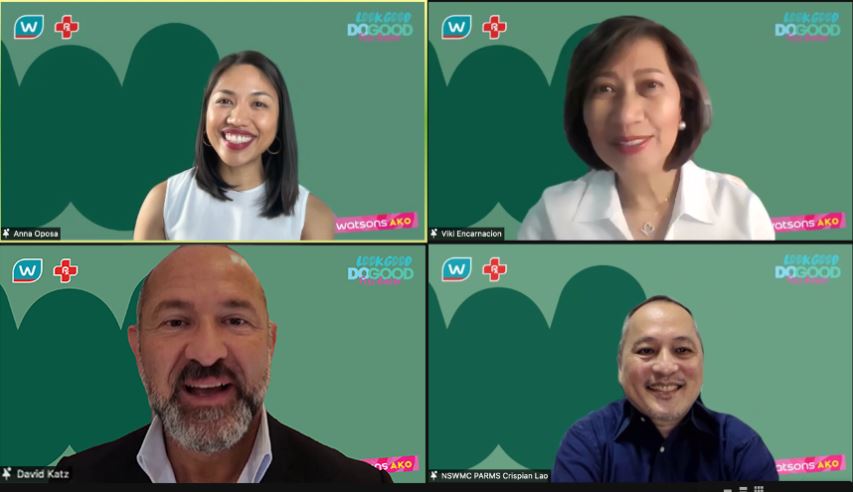Watsons recycles 833,000 plastic bottles, incentivizes suppliers to go green

WATSONs, the drugstore and cosmetics one-stop shop, has been able to recycle 833,000 plastic bottles from their stores. This was disclosed during a webinar where Watsons discussed their sustainability plans from last year and into the future.
Viki Herrera-Encarnacion, Watsons Philippines Public Relations and Sustainability Director, talking during the Watsons Do Good Webinar on March 17, said that last year, customers were able to access about 1,200 sustainable products that were deemed to have more planet-friendly packaging and ingredients, and reduce electricity intensity by 17% from 2015. More importantly, it has been able to recycle 833,000 plastic bottles from their stores in a collaboration with Plastic Bank.
Plastic Bank, according to its website, has a network of plastic collection branches that “gather plastic waste directly from local beaches, riverbanks, neighborhoods, and even households.”
“Our collectors exchange plastic waste at local Plastic Bank branches for bonuses that help provide basic family necessities, such as groceries, cooking fuel, school tuition, health insurance, digital connectivity, and clean drinking water. By offering safe, secure, and traceable sources of income, we’re empowering vulnerable communities with a path out of poverty,” said the social enterprise. In turn, the collected plastic is turned into a product called Social Plastic feedstock “used in the production of products and packaging — thus helping create new life for old plastic,” they said.
“Admittedly, these numbers are small relative to the problems the world faces today. That is why in the coming months, Watsons aims to step up our programs for the communities and the planet,” said Ms. Herrera-Encarnacion.
Watsons has incentives for suppliers when they tick off their sustainability goals. “For a retailer like us, for any program to make a strong impact, we must involve many stakeholders… for our suppliers, we’re encouraging them to come up with more sustainable products,” said Ms. Herrera-Encarnacion. She encourages suppliers to have more options for refill packs, and use more planet-friendly ingredients for their products. “We incentivize them. Once they qualify for that classification, we actually give them more display space.” From the 1,200 sustainable products they already have, they plan to double that number.
“There had been over 10 trillion kilos of plastic produced so far [in history]. All the plastic that we have produced are still here,” David Katz, CEO and founder of Plastic Bank, pointed out during the webinar, calling from Vancouver.
“Recycling isn’t just an opportunity to return material back in the manufacturing in the supply chain. It’s an opportunity to look at things differently. To look for where there is worth where others saw waste. See where all these opportunities where others thought there was despair,” he said in a speech. “With our partnership with Watsons, the world is powerfully going to not just witness the change of the communities and the lives of our collectors, but they are going to see a new way of thinking and new way of doing business.”
The Philippines generated about 44,000 tons of waste per day in 2019 said Crispian Lao, Vice-Chairman of the National Solid Waste Management Commission (under the Office of the President). “Each person contributes about 0.3-0.7 kilograms,” he said. “What’s important is to segregate whether (in) your home, in your workplace, and wherever you are, you need to segregate. It’s not only the law but it helps in the whole ecosystem of waste management,” he said, citing the Ecological Solid Waste Management Act 4A9003 (otherwise known as Ecological Solid Waste Management Act of 2000).
He said that one can drop off residual waste at different SM Malls, some of which “already have trash to cash programs.”
On a parting note, he gave a laundry list of simple things an individual can do to help make a less-polluted planet. “Bring your own grocery bag as you go shopping, buy in bulk, avoid small packets when feasible, purchase quality and repairable products, and participate, as I’ve said, in recovery programs and drop-off centers or at least the minimum: bring it to junk shops… finally, if you have waste to dispose of, please dispose properly.”
“It is critical for us to do our share for the environment and participate in the programs that are already there, and if possible, develop your own programs within your community,” he said. — Joseph L. Garcia



